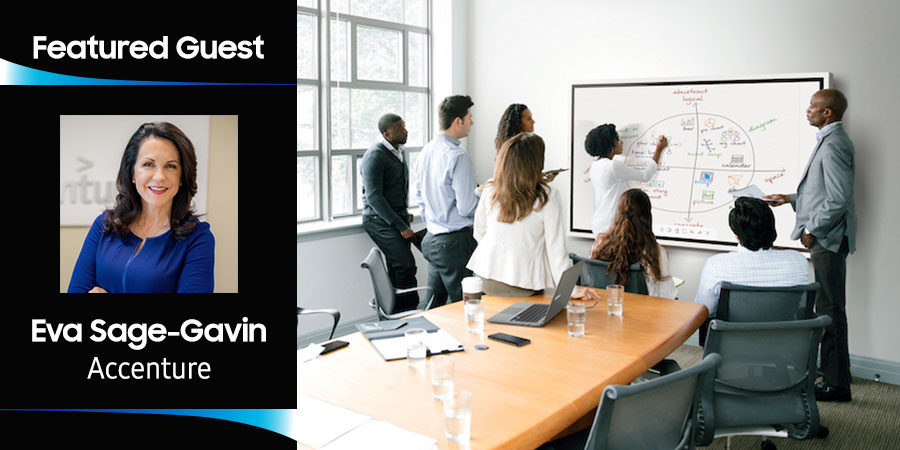Editor’s Note: This conversation is part of our ongoing “Future State Of” series. It has been edited for length and clarity.
How we work is being fundamentally challenged in the wake of the COVID-19 pandemic. And how leaders manage and communicate with their rapidly evolving workforce is a significant opportunity. The most successful business leaders of the future will embrace these changes and develop strategies that leverage the current disruption to benefit individuals, their firms and society. Taher Behbehani, GM and SVP of Samsung B2B, sits down with Eva Sage-Gavin, Senior Managing Director of Accenture’s Talent & Organization/Human Potential practice, to discuss her thoughts on how corporate leaders can thrive in the current situation.
Taher Behbehani: Hi, Eva. Thanks for speaking with me today. CEOs were under scrutiny before the pandemic hit, and I am wondering how that scrutiny is changing and what the best leaders are doing to manage it.
Eva Sage-Gavin: Now more than ever, leaders are in the spotlight, and how they respond is a central part of the story playing out today. The best leaders are focusing on five themes to manage at the intersection of social impact and brand. They are:
- Purpose accelerated. Purpose was already rising in importance, and now it matters more than ever. At the top of every C-suite leader’s priorities is the awareness that purpose must be highly inclusive and deeply connect with all stakeholders, especially those who have been historically underrepresented.
- The Maslow uncertainty. Self-actualization has given way to basic needs, and CEOs are paying closer attention to, and acting on, the needs of employees and customers in real-time.
- Health and wellness. What’s healthy for “me” becomes healthy for “we.”
- Change accelerated. A key lesson of this crisis, not lost on employees and consumers, is that we can quickly change when it is essential.
- Trust. Trust is key. The Edelman Trust Barometer finds that 62 percent of employees trust their employer to respond effectively and responsibly to the coronavirus outbreak. This presents a new responsibility for many CEOs: Serving as the “primary source of truth” inclusive of all their employees and their families — when lives are at stake.
TB: Employees and organizations have come to depend on adequate work-from-home (WFH) support. What are the most effective strategies business leaders are utilizing to stay fully engaged with their teams?
ESG: We have seen many major companies have extended their WFH options. I have also seen some interesting and innovative strategies to connect with employees in WFH environments.
Regular employee check-ins via videoconference platforms are very important. Companies are also hosting videoconferences with their entire employee base with the CEO, CHRO or CPO and guest speakers, industry experts, doctors, influencers and even celebrities and professional athletes. The most compelling is the use of two-way dialogue with chats, Q&A and polls.
Emerging changes from the pandemic era
See key learnings and statistics from the Future State of Business 2020 survey and report. Read Here
Many companies are looking for ways to empower their employees to work effectively at home. Some are offering reimbursement for enhanced devices like monitors, phones, laptops, video cameras and headphones/earbuds. Others are providing stipends to help recreate the office setup at home, which could include standing desks and ergonomic chairs. New employee education platforms have created the opportunity to share tips and FAQs for your WFH people, such as how to effectively lead or participate in videoconference calls, stay connected with colleagues and be healthy and safe.
It is all about leveraging technology to support humans and enhancing the WFH experience.
TB: I know resilience is a key focus for you. How are the current crises impacting the resilience of not only workers, but also the people who lead them?
ESG: I’m glad you asked. Resiliency is so vital during this time, as the current crises are impacting workers and leaders worldwide.
Recent Accenture research with 3,200+ global C-suite executives shows that half of survey respondents rated their organization as chaos-ready. We call this organizational resilience. And it’s a precious currency right now.
When we looked at what those leaders were doing differently in a crisis, we found five factors that helped them be as ready and responsive as possible, including:
- Transparency with people metrics and giving individuals the pathways to keep their skills current and relevant.
- Providing opportunity for new skilling. According to our data of over 4,500+ global workers, 56 percent of full-time people are currently learning a new skill. COVID-19 has only accelerated the need for this.
- Redesigning the way work gets done. Crisis-ready CHROs ensure that as automation takes over rote or repetitive work, people are given the opportunity to take on tasks best suited for humans.
- Performance management redesigned for collaboration. Leading CHROs are redesigning performance management to reward collaboration over competition. This means actively incentivizing people to work across typical functional boundaries and make those around them better.
- A people-first approach to change. Designing change with a people-first mentality looks very different than designing change without it. Change should happen “with,” not “to,” your people.
TB: Given your passion for empowering transformation in the workplace, are there aspects of what companies are going through now that are forcing positive transformations to occur more rapidly?
ESG: Absolutely! In upcoming research, we show how both organizations and their workers are looking to build back better from our current crises. Nearly 70 percent of people in our study of 4,500+ global workers believe companies will strengthen their commitment to solving considerable societal challenges. We saw this in our shared resiliency work, too. Shared workforce resilience means keeping as many workers healthy, safe and employed as possible by equipping people with new skills for the future.
Accenture has partnered with CHROs of leading companies to create People + Work Connect, an analytics-based platform that facilitates continued employment. It gives organizations with open positions a view into the workforces available to fill those jobs, enabling organizations with available people to help them find new roles.
Building rapid response capabilities goes far beyond any one crisis and into a new future of work fueled by the courage to try new things, a commitment to responsible leadership and a sense of shared purpose that fosters the greater good.
TB: What are you advising leaders on adapting the tone they are taking when communicating with their workers and their customers?
ESG: During a crisis like COVID-19, people look to leaders for compassion, care and confidence. A leader’s tone and communications need to reflect these attributes. There is no playbook for dealing with a pandemic, and letting people know they are respected, valued and supported is an impactful way a leader can give back.
Our findings show that Responsible Leadership has taken on a deeper meaning, as our workforces and customers find themselves in an unfamiliar, fast-moving global environment. COVID-19 has changed the way we live and work, with far-reaching impact. Setting the tone and leading with compassion and care for workforces, customers and communities is essential.
TB: This has been a great conversation. Is there anything else we haven’t touched on that you feel is essential?
ESG: Thank you for inviting me to have this great conversation with you.
I will leave you with this: A principal responsibility for all leaders is to understand what skills are needed in their organization as the work changes. Skills that are required to stay relevant will continuously change. It’s a certainty, and it is the leader’s responsibility to look ahead to understand the skills their businesses will need to continue to be successful.
Talent is the single most precious asset worthy of extraordinary investment. Organizations are facing a range of challenges that force them to reconsider the composition of their workforces. By looking at an individual’s skills and external data, inferences can be made to other roles the person can aspire to. This allows an individual to understand their skills more clearly and opens doors to new career pathways.
The crisis has been — well, a crisis — and leaders have an opportunity now to lead in profound ways. It is about adapting and evolving to be better than before, more resilient, more inclusive and more skilled than they could have ever imagined.
For more information on Accenture’s Talent & Organization/Human Potential Practice, please visit:
https://www.accenture.com/us-en/services/talent-organization-human-potential-index
You can find Eva Sage-Gavin on social media at:
https://www.linkedin.com/in/evasagegavin/
https://twitter.com/sageeva3
Discover how Samsung’s social distancing management solutions can help you return to work with confidence. And keep up to date with the latest announcements and insights by following Taher Behbehani on Twitter.








